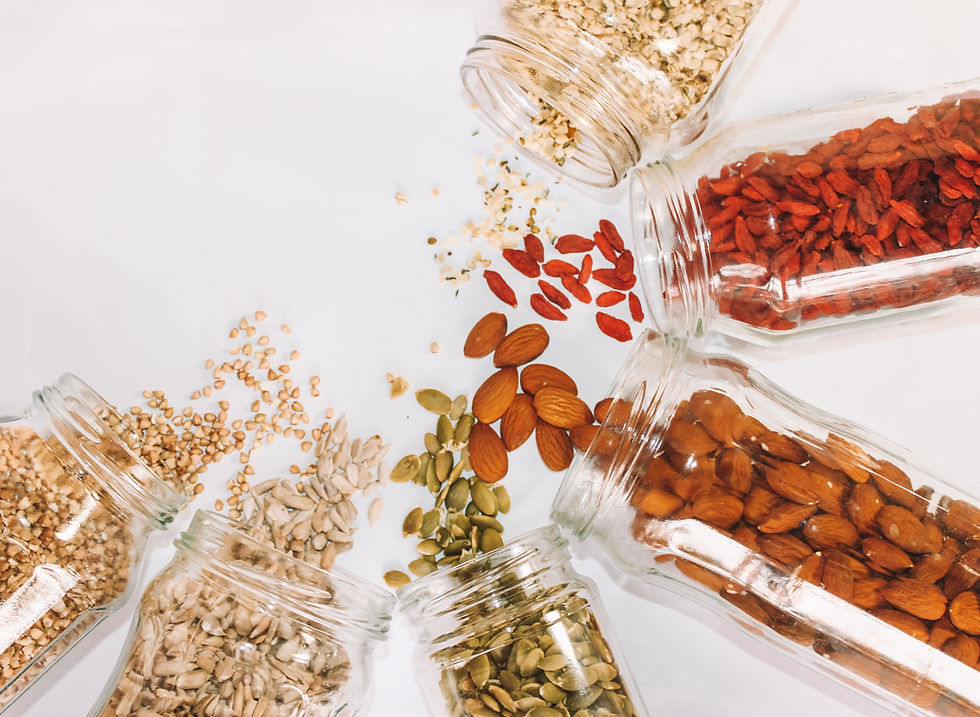Bone-Strengthening Foods: What to Eat for Faster Healing and Stronger Bones
- Dr. K.

- Aug 30, 2024
- 2 min read
Updated: Mar 29, 2025
Bone health is crucial, especially when recovering from an injury. After breaking my ankle this month—my second fracture, the first being in my 20s—I've been paying extra attention to the nutrients that support bone strength and healing. It’s been a learning experience, and I’ve discovered so many foods beyond the usual dairy options that can help with recovery.

Calcium-Rich Foods Beyond Dairy
If dairy isn’t your thing, don’t worry—plenty of plant-based foods are loaded with calcium. Leafy greens like collard greens, kale, and broccoli are excellent sources. A cup of cooked collard greens packs a solid calcium boost, while kale and broccoli also contribute. Moringa leaves, sesame seeds (and tahini), and even seaweed (like nori) can up your calcium intake.
One of my favorite discoveries has been ragi (finger millet), a calcium-rich grain that’s a staple in Indian cuisine. If tofu isn’t appealing, edamame is another great alternative, packed with calcium and protein.

Nuts and Seeds for Bone Health
Nuts and seeds are an easy way to add bone-supporting nutrients to your diet. Almonds provide calcium, chia seeds are surprisingly rich in it, and Brazil nuts offer both calcium and magnesium, which is essential for bone strength.

Fruits for Bone Health
Fruits may not be the first thing that comes to mind for bone health, but they play an important role. Oranges and kiwis provide vitamin C, which helps with collagen formation—a key component of bone structure. Berries, known for their antioxidants, also contribute to overall bone support.

Plant-Based Milks and Fortified Foods
If you prefer non-dairy milk, look for fortified options. Almond, soy, and oat milk often contain as much (or even more) calcium than dairy milk. Just be sure to check the labels to confirm the calcium content.

Other Important Nutrients for Bone Health
Beyond calcium, other vitamins and minerals help keep bones strong. Vitamin D is essential for calcium absorption, so getting some sunlight or adding vitamin D-rich foods (like fortified plant milks or mushrooms) can help. Potassium supports bone density—bananas, avocados, sweet potatoes, and spinach are all good sources. Iron is also important, and you can get plenty from lentils, chickpeas, spinach, and fortified cereals.

What to Limit
Certain habits can negatively impact bone health. Too much sodium can cause calcium loss, so cutting back on highly processed foods is a good idea. Excessive caffeine may also interfere with calcium absorption, so moderation is key.
Supplements and Daily Calcium Needs
If you’re struggling to get enough calcium from food alone, supplements can help. Most adults need between 1,000 and 1,300 mg of calcium daily, and vitamin D is often recommended to support absorption. Always check with a healthcare provider before adding supplements to your routine.
Recovering from an injury is tough, but knowing that the right nutrition can help strengthen my bones makes the process feel a little more manageable. If you're looking to support your bone health—whether due to injury or just for overall well-being—there are plenty of delicious and varied options to explore!





















